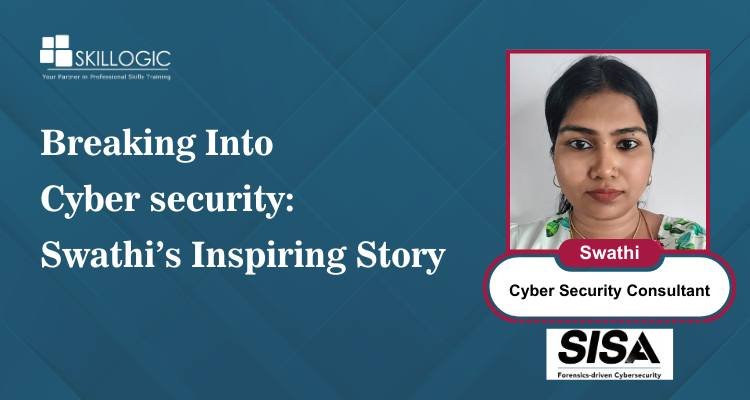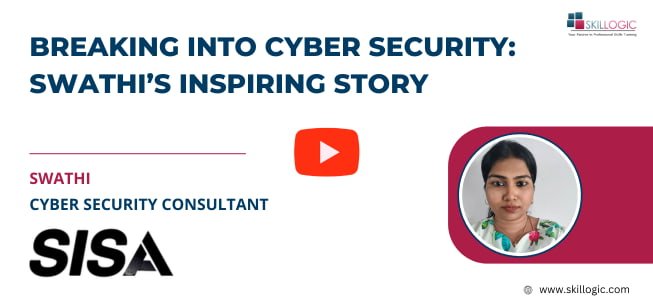Swathi's Cyber Security Journey from Mechanical Engineering
Swathi's Cyber Security Journey from Mechanical Engineering is an inspiring transition from a non-IT background to a thriving tech career. Discover how she overcame challenges, built new skills, and carved a successful path in cyber security from her mechanical engineering roots.

Starting her professional journey as a mechanical engineering graduate, she landed her first offer at L&T but turned it down due to relocation concerns. Instead, she began working in tech roles at GlobalLogic and Wipro, eventually becoming a team lead in 2019. Despite a stable career, her curiosity about the booming cyber security industry pushed her to explore something entirely new.
With no prior experience in networking or IT, switching fields wasn’t easy. But she was determined. What made the difference? SKILLOGIC’s beginner-friendly, hands-on training, constant support, and dedicated placement assistance. Today, she’s proudly working as a Cyber Security Consultant at SISA, and it all started with the right guidance and learning environment.
Let’s take a look at how SKILLOGIC helped her confidently transition into cyber security and land a role in a top firm.
Swathi’s Journey: Mechanical Engineering to Cyber Security
Let’s hear from Swathi herself as she shares how she shifted gears from mechanical engineering to cyber security, and how SKILLOGIC guided her every step of the way:
Q1. What’s your educational background, and where did your career start?
I studied mechanical engineering and got placed in L&T during college, but the job was in Mumbai while I was in Hyderabad. My father wasn’t comfortable with me relocating, so I didn’t take it up. Instead, I started working at GlobalLogic and later moved to Wipro, where I was promoted to a team lead in 2019.
Q2. What made you think about cyber security as a career option?
I kept reading about how there were over 3.5 lakh cyber security job openings and how it was a booming field. That got me curious. I felt it was the right time to switch domains and try something new. Even though I had leadership experience, entering cyber security meant starting fresh, and that wasn’t easy.
Q3. How did you find the right training to make this career shift?
I was looking specifically for offline training, not online. After searching nearby institutes in Bengaluru, I found SKILLOGIC. The ratings were great, and when I spoke to Sindu from their team, she explained that the course included placement assistance. That support gave me the confidence to enroll.
Q4. Did you know anything about cyber security before joining the course?
Not at all. I didn’t even know how many ports exist in networking! When my trainer talked about port numbers in the first session, I was completely new to it. But the course started from scratch, so it was beginner-friendly.
Q5. What was your learning experience like during the course?
My trainer, Fatima ma’am, made things incredibly simple. She explained every topic in detail, both theory and practical. For example, she didn’t just say “use Nmap,” she broke down every part of the command so we understood what we were doing and why. She also showed us how to do attacks like DOS using simple commands.
Q6. Was the course practical enough? Did you get hands-on experience?
Absolutely! The course had a strong hands-on focus. We were encouraged to try things on our own,install systems, execute tools, run simulations, and come back with our results. We also had practical assignments and tool-based labs. For example, I worked on tools like Nessus and learned how to install and use them.
Q7. Did you get support during the course when you got stuck?
Yes, every time. Whether it was technical doubts, installing tools, or understanding commands, help was always available. That support made a big difference, especially since I had zero background in cyber security.
Q8. Tell us about your project work. Was it something you got to choose?
Yes, I chose to present over 60 tools we had learned during the course. I made a full presentation with explanations and demo videos. It was actually ma’am’s idea to turn it into a full-fledged project. The best part is I got full support while working on it.
Q9. How did you manage your time during the course?
My son was in school, so I used to drop him off and attend the class. I didn’t spend a lot of extra time outside the classroom because the sessions were so thorough. The trainer simplified everything so well that I could grasp most of it during class itself.
Q10. How was the placement assistance and interview preparation support?
Yeah, so for the interview, I read everything that ma’am gave me, literally everything from scratch. It might sound like it’s promotional, especially if you’re watching this on YouTube, but it’s honestly not. I just followed all the notes she provided. When I went for interviews, they asked very basic questions, like how to bypass a firewall or which Nmap scans can be used. So yeah, I just studied the notes thoroughly, and that’s pretty much all I did to prepare.
Q11. What would you say to someone from a non-technical background looking to get into cyber security?
Don’t be afraid to start from scratch. If someone like me, from mechanical engineering with no prior exposure to networking or IT, can do it, you can too. Just find the right training support and stay consistent.
Refer to these articles:
- Bhuvan’s Path to Becoming a Cyber Security Expert
- Hari Charan’s Journey to Cyber Security Success
- Libin’s Cyber Security Journey: From Fresher to Security Analyst
How Swathi Broke into Cyber Security: Key Insights
Here are the key insights from Swathi’s inspiring journey into cyber security, especially useful for those starting from a non-technical background:
- Cyber Security is Beginner-Friendly: You don’t need coding experience or a tech degree to get started. A structured course that starts from scratch can get you job-ready.
- Pick the Right Training Format: Offline, interactive classes can make a huge difference for learners who struggle with self-paced or purely theoretical online content.
- Go for Practical Training: Tools like Nmap, Nessus, Wireshark, etc., are essential in interviews and jobs. Pick courses with hands-on labs, simulations, and tool-based learning.
- Strong Mentorship Helps a Lot: An approachable, experienced trainer can simplify concepts, clear doubts instantly, and keep your learning on track.
- Portfolio Projects Can Set You Apart: Building a tool-based project or documentation, as Swathi did, is something you can showcase in interviews, it adds real value.
- Consistent Practice is Key: Even if you're new, regular practice, tool exploration, and staying curious will help you quickly grasp new concepts.
- Use Provided Materials Fully: Many candidates overlook course notes or guides. As Swathi proved, thoroughly studying the provided materials was enough to clear interviews.
- Don’t Fear the Learning Curve: Starting something new can be overwhelming, but taking that first step and staying committed can lead to big transformations, even into core cyber roles.
Refer these articles:
- How to Choose the Best Institute for Cyber Security in Bangalore
- How much is the Cyber Security Course Fees in Bangalore
- How to Choose Best Institute for Cyber Security in Hyderabad
Swathi’s transformation from a mechanical engineer to a Cyber Security Consultant at SISA is a powerful reminder that your background doesn’t define your future. With SKILLOGIC’s structured, beginner-friendly training, hands-on labs, and strong mentorship, she was able to confidently switch domains and land a role in a top cyber security firm. Her journey proves that with the right support system and consistent effort, breaking into cyber security is absolutely possible, even without prior IT experience.
If you’re planning to pursue a cyber security institutes in Bangalore, it’s also worth exploring training options in other tech-driven cities like Chennai, Hyderabad, Pune, Ahmedabad, Mumbai, Coimbatore, Delhi, Kochi, and Kolkata. With the global cyber security market projected to grow from USD 172.24 billion in 2023 to USD 562.72 billion by 2032 as reported by Fortune Business Insights, the demand for skilled professionals is on the rise especially across India.
To meet this growing demand, several top institutes now offer practical, classroom-based training that equips you with real-world skills. Among them, SKILLOGIC stands out as a leading institute offering industry-relevant cyber security programs in both offline and online formats.
With over a decade of experience and more than 1,00,000 learners trained globally, SKILLOGIC has earned its reputation for quality education. Their programs include hands-on lab access, expert instruction, globally recognized certifications like NASSCOM FutureSkills and IIFIS, and solid placement support. Learners also get access to internships, 24/7 cloud labs, and personalized mentorship.
The Cyber Security Professional Plus course at SKILLOGIC is designed for those who want job-ready training using real tools and simulation-based learning. Whether you're interested in offline cyber security institutes in Hyderabad, Bangalore, Pune, Chennai, Coimbatore, Mumbai, Ahmedabad, or prefer learning online, SKILLOGIC offers a flexible, career-focused path into the cyber security field.


0
420